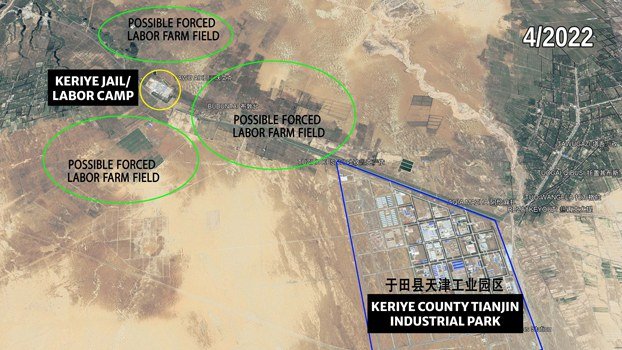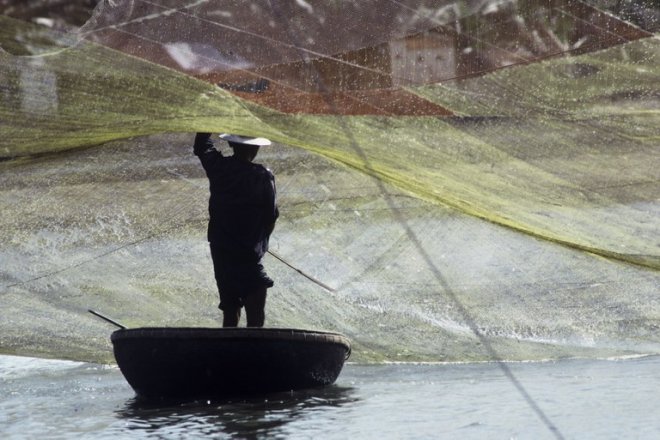Uyghur inmates forced to work on farmland leased to Chinese
Hundreds of Uyghur inmates at Keriye Prison in the far-western Chinese region of Xinjiang are forced to work 12-14 hours a day in vast fields of red dates called jujubes, a prison employee and a guard told Radio Free Asia.Under the watch of armed guards, the prisoners must walk to the fields while overseers wearing red vests and holding police dogs monitor them, the two people said. Armed soldiers surrounded the work area, some on horseback, to prevent any from escaping.
“I witnessed prisoners being forcibly taken out to work during the day and returned to their cells at night,” said the prison employee – a Uyghur himself – who has worked at the prison for nine years, including one as a “team leader” of a group of inmates, although he was not allowed to mingle or talk much with them.
Many inmates also work in factories located inside and outside the prison walls producing cement, shoes, gloves and tea, a prison guard told RFA Uyghur.
Those serving sentences of more than 10 years work in factories inside the prison yard, while those serving less than 10 years work outside the prison, the guard said.
The goal seems to be two-fold: To harness the prisoners’ free labor for the benefit of Han Chinese businessmen who rent the 1,650 acres of farmland that is owned by the prison, and to reform the inmates through labor, the two sources said, insisting they not be identified for fear of retaliation.
“They want to make the prisoners undergo ideological transformation through labor in these big fields,” said the prison employee.
The farm itself is called Lao Gai Nong Chang in Chinese, which means “Re-education through Labor Farm.”
The work was arduous and painful, he said. Before the fields were converted to jujubes, they produced cotton, and he recalls seeing some inmates picking cotton worked until their hands bled.
Arbitrarily sentenced
The offenses committed by the Uyghur inmates in Keriye Prison – located about 25 kilometers (16 miles) from Siyek township in Hotan prefecture and which houses about 10,000 inmates – remain unclear.
Most Uyghurs detained in Xinjiang in recent years have never been formally charged with any crime or tried by the government.
More than 30 Uyghur teachers from Hotan Normal Technical High School jailed on charges of “national separatism” and “religious extremism” are serving their sentences in Keriye Prison, RFA previously learned.
 Keriye Prison has tracts of farmland around it. Credit: Google Earth photo; RFA annotation
Keriye Prison has tracts of farmland around it. Credit: Google Earth photo; RFA annotation
Though China formally abolished its “reform through labor” system in 1994, this account shows that it has remained in practice in some areas.
Starting in 2017 and 2018, Chinese authorities in the Xinjiang Uyghur Autonomous Region detained an estimated 1.8 million Uyghurs and other Muslim minorities in “re-education” camps, where they were subjected to forced labor in factories producing textiles, wigs, tomatoes and solar panels for export.
The forced work and other abuses, including torture and sexual assaults, are part of a wider genocide that China is committing against the Uyghur people, the United States and other governments have declared.
Beijing denies the abuses, saying the camps were vocational training centers meant to prevent terrorism and religious extremism while teaching job skills.
Chinese rent the land
Many Han Chinese from Henan province and Xian, capital of Shaanxi province in northwestern China, rent the prison land under three-to-four-year contracts, the team leader said.
For example, a Chinese businessman from Henan province leased about 200 acres on which he grew cotton for five or six years before switching to jujubes, he said.
Under an agreement between prison administration and the factory owners, the Chinese owners pay the prison for using the forced labor, he said.
“Some factories have 200 to 300, or even 500 workers,” said the guard. “In the factory where I work, we have around 1,670 workers.”
In 2022, the United States enacted the Uyghur Forced Labor Prevention Act, which gave American authorities greater powers to block the import of goods linked to forced labor in China.
Under the act, goods produced in Xinjiang are legally assumed to have involved Uyghur forced labor unless a business can prove otherwise to customs officials.
However, hundreds of major U.S. companies may be unwittingly producing goods using gold that was mined using the forced labor of Uyghurs in China’s far-west Xinjiang region, according to a report released Wednesday by the Center for Advanced Defense Studies.
Translated by RFA Uyghur. Edited by Roseanne Gerin and Malcolm Foster.
[圖擷取自網路,如有疑問請私訊]
|
本篇 |
不想錯過? 請追蹤FB專頁! |
| 喜歡這篇嗎?快分享吧! |
相關文章
AsianNewsCast























